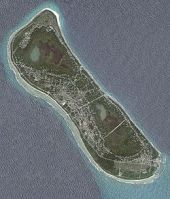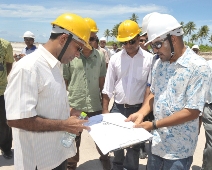The Maldivian prison population could be reduced by up to two-thirds if the government would “de-criminalise the offence of drug usage and propose mandatory rehabilitation”, according a report by the government and the United Nations Development Program (UNDP). The reform could reduce the number of youth incarcerated for minor offences, the report suggested.
The report also found that “the existing legislative framework and the current penal system does not support the human rights guaranteed under the Constitution, nor is it compatible with best practices outlined in the UN Standard Minimum Rules on Treatment of Prisoners.”
The “Prison Assessment and Proposed Rehabilitation and Reintegration of Offenders Report“, published on September 5, was conducted by Dr Aishath Ali Naaz and UNDP program specialist Naaz Aminath. The report surveyed 60 percent of the prison population as of February 2011 to assess current prison conditions and make recommendations.
It is the first report of this scope to be done in the Maldives.
Aminath said the report took five months to prepare. “It involved very consistent record-taking and visits to prisons. About part way through we realized that we needed a legal framework to make a more comprehensive report, so we met with MPs across the board to understand the strengths and weaknesses.” The team had met with government officials throughout the project.
Aminath said timing the release of the report was difficult after the release of prisoners from Maafushi prison in July.
Key issues identified in the report were a lack of legislative framework to support rehabilitation and reintegration programs; widespread accusations of corruption and inappropriate political influence among institutions; poor prison design; and inadequate budgeting and human resources.
The report’s first recommendation for reform was to “de-criminalise the offense of drug usage” and require rehabilitation, according to the offender’s criminal record.
A second recommendation to “establish a restorative justice program to minimize offenders being incarcerated for minor offences” would regulate the currently heavy flow of Maldivian youth into the prison system.
Of prisoners in the Maldives, the majority are males under 30 years of age who are educated below O-levels. At the time of the report, 66 percent of inmates polled were in jail for drug use or possession.
“There are small time drug users of 23 years of age who are being being sentenced for 70 years in prison,” said Aminath. “When you visit other countries, the jails are divided between minimum and maximum security according to the sentence. You know that criminals in maximum security areas are really hard-core. You also find that drug trafficking is a serious offense in most countries, and traffickers do the most time in jail. But here, traffickers get 25 years while small-time users get 60 to 80 years. These are not hard-core criminals, but they’re put away for almost their entire lives.”
Aminath noted that in the past, drug users who test positive for drugs were given two charges: one for using drugs, and another for testing positive. At present, only individuals in possession of a prohibited drug are prosecuted.”
“I’m not condoning drugs,” said Aminath, “but I think we need to help.”
The report criticised Maldivian prisons for being understaffed and poorly managed.
“The problem in the Maldives is that there aren’t proper prisons,” said Aminath. “It’s hard to even say what the capacity of these facilities is.”
After the fires in 2009, Maafushi prison in March and October 2009, Aminath said that basic living equipment like mattresses were not replaced. Maafushi and Male prisons do not have kitchens, and “there is no structure to support the prisoners who are there,” she said.
Asseyri prison was originally designed as a juvenile rehabilitation center. But Aminath noted that it remained empty until this past year, and since then has been filled with inmates of all ages. She said individuals she asked regarding it’s changed purpose were uniformed.
Inmates surveyed said medical services were inadequate. An investigation found that Maafushi prison compensated by sending an average of ten people to Male each day for medical purposes–an excursion which opens opportunities for smuggling good into prison.
Inmates also complained about a lack of structure in prison life. The report lists claims of torture, inhumane treatment, drug availability and false messages of hope from politicians as examples.
Prison regulations also make it difficult for inmates to develop their own structure. Aside from the Qur’an, inmates are not allowed to have any reading material. Only Asseyri and Maafushi prisons have ‘libraries’–rooms with a few books located outside the gated complex. “It’s risky to go there because it’s not within a protected area, and there simply aren’t enough staff to organise daily library trips,” said Aminath. “Plus, there isn’t much to read there. Really, I wouldn’t even call it a library.”
Naaz and Aminath asked prisoners to describe the types of rehab programs they felt were needed. Most recommended religious education (86.4 percent), counseling therapies (76.1 percent) and life skills (75.1 percent).
Among the report’s recommendations for reform is the development of a Mental Health act. It also encourages Parliament to pass legislation that was proposed 3 years ago, including a criminal procedure code, a penal code, an evidence act, and a parole bill.
Another suggestion is to establish a prison industry to train prisoners in vocational skills, a program that would directly support rehabilitation and reintegration programs.
Aminath said the research team is in conversation with the State Minister, and the Home Minister supports the recommendations.
Speaking at a press conference yesterday, Home Minister Hassan Afeef said, “the Government is committed to improving the rehabilitation system, given
how large a problem drugs are for our community.”
But change won’t happen overnight, Aminath cautioned. She said all institutions “need to strengthen the legal framework and get more involved with the community to make these changes. This applies to all institutions across the board here.”
Correction: A previous version of this story stated that the UNDP team had “‘met with government officials across the board to understand the strengths and weaknesses.'” It should have stated that the UNDP team had “met with MPs across the board to understand the strengths and weaknesses and advocate passing legislative framework bills.” The UNDP team had been in correspondence with government officials from the beginning of the project.
The previous version of the story also stated that, “Aminath noted that drug users who test positive for drugs are given two charges: one for using drugs, and another for testing positive.” It should have stated that “Aminath noted that in the past, drug users who test positive for drugs were given two charges: one for using drugs, and another for testing positive. At present, only individuals in possession of a prohibited drug are prosecuted.”
The previous version also stated that “Asseyri prison was originally designed as a juvenile detention center.” It should have stated that “Asseyri prison was originally designed as a juvenile rehabilitation center. Also, individuals who Aminath asked about its current use as a standard detention center were uninformed. Minivan News apologises for any confusion.”

